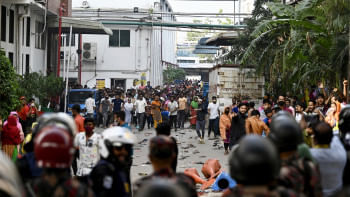Must workers die for seeking fair wages?

Amid the death of another garment worker, we fail to comprehend the absurdity of how factory owners and government authorities are approaching ongoing protests over the minimum wage for workers—which, far from quelling them, is only sowing the seeds for further unrest. Jalal Uddin, supervisor of a factory in Gazipur's Konabari, was shot by police on November 8 after he was returning home following the closure of his factory, and succumbed to injuries on Saturday night. He was among the four people to have died since protests began—three of them in police shootings, including Anjuara Khatun from the same factory. This is totally outrageous.
After Jalal's death, his wife rightly asked: "Why did they [cops] shoot? Couldn't they disperse the [protesting] workers in any other way?" We also share these questions. Reportedly, Jalal's abdominal region had scars from at least 60 pellets lodged inside, and there were more on other body parts. Why did the police have to be so violent, and upon whose orders have they shot agitating workers? Apparently, the factory where both Jalal and Anjuara used to work is owned by Dhaka North City Corporation Mayor Atiqul Islam, as per our report. Can he and other owners avoid responsibility for these incidents?
The minimum wage board, too, must share the responsibility for failing to fix an acceptable wage. It has increased the starting salary from Tk 8,000 to Tk 12,500, which is far less than the Tk 20,393 proposed by workers' representatives. If you consider the current value of the dollar, the new wage amounts to a little more than the existing one. It was only logical then that workers felt compelled to get back to the streets demanding a higher wage, to a brutal response so far. Some 40 cases have been filed in Gazipur and Ashulia, and around 19,500 people have been accused in these cases. Moreover, many owners have shut down factories, meaning no pay for their workers, which is also concerning.
The question is, who do those in charge must always let things descend to a point where desperate measures need to be taken? Why can't they be reasonable about the very legitimate concerns of workers? RMG exports have reportedly increased 24 times over the past three decades, and the country in general benefitted from it, but aren't workers entitled to some benefits as well? Why must they toil for so little? A reasonable solution is all the more necessary given concerns about timely delivery of shipments as well as fears that buyers may not place fresh work orders amid ongoing unrest. We hope the authorities will stop antagonising and victimising workers, and instead set a wage that brings lasting solutions.


 For all latest news, follow The Daily Star's Google News channel.
For all latest news, follow The Daily Star's Google News channel. 










Comments